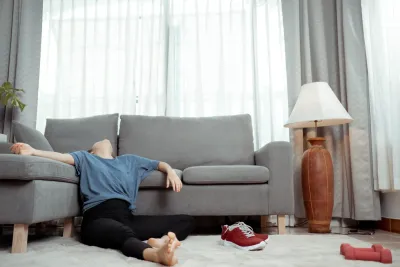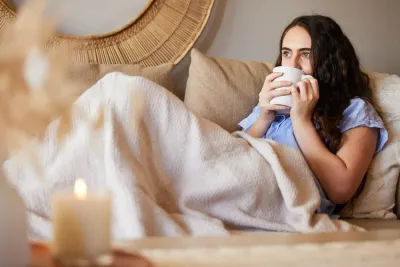Menopause and Sleeping Too Much: Understanding Menopausal Fatigue
Ana Marie Schick: Resident Sleep Expert and Certified Health Coach • Oct 30, 2024

Key Takeaways
Sleeping too much during menopause is often linked to hormonal shifts, disrupted sleep quality, and underlying sleep issues that leave the body feeling exhausted instead of restored.
- Hormonal changes during menopause, especially declining estrogen and progesterone, can disrupt sleep cycles and lead to [excessive daytime sleepiness](/post/excessive-yawning-causes).
- Postmenopausal women have a higher risk of sleep disorders like sleep apnea, which can fragment nighttime sleep and cause persistent fatigue.
- Lifestyle factors such as chronic stress, low physical activity, and inconsistent sleep schedules can worsen feelings of exhaustion during menopause.
- Oversleeping does not always equal better rest. Poor sleep quality can leave you tired even after long hours in bed.
- Regular movement, consistent bed and wake times, and a cool, comfortable sleep environment can help reduce fatigue and improve daytime energy.
Menopause is a natural phase that every woman experiences, typically around the age of 50, though for many, it can also occur earlier or later. Women undergo significant hormonal changes during this time that can disrupt various bodily functions, including sleep.
Women who struggle with menopause often have a difficult time getting quality sleep. They may have trouble falling asleep, staying asleep, or achieving restful sleep, which often results in fatigue and exhaustion.
Below, I'll explain menopause fatigue and provide useful tips to help you manage it effectively.
Why Menopause Can Cause Excessive Sleepiness
The menopausal transition is marked by a variety of symptoms, with fatigue being one of the most common. This fatigue can often be overwhelming, making it feel as though no amount of sleep will ever be enough.
One primary culprit behind this is sleep apnea. This condition disrupts your breathing during sleep and is more frequent in postmenopausal women due to hormonal changes.
Hormonal changes play a significant role in menopause fatigue. The loss of protective hormones such as estrogen and progesterone increases the risk of developing sleep apnea.
Also, adrenal and thyroid hormones can be affected, contributing to feelings of tiredness and exhaustion. The majority of fatigue rises dramatically, from 19.7% in premenopausal women to 85.3% in postmenopausal women. [1]
Did You Know: Feeling off-balance lately? Discover what’s behind menopause dizziness and explore effective treatments to help steady the spin.
Juggling work and family can not only be stressful but downright exhausting. Stress makes getting quality sleep difficult, and even more so when you're dealing with symptoms of menopause. [2]
Insomnia often becomes a direct symptom of menopause, causing daytime tiredness and a persistent feeling of being exhausted. Some women use over-the-counter sleep aids such as melatonin.
Melatonin or other sleep aids may offer short-term solutions to poor-quality sleep, but to address the root causes of sleep disturbances, you’ll want to speak with your primary doctor first.
Menopause Relief
Transform your sleep experience during menopause with the Chilipad. Enjoy the tranquility of peaceful, cool nights and leave behind the discomfort of overheating.
Reduce Menopause Symptoms—Backed by Real Results
Hot flashes, night sweats, and restless nights don’t stand a chance. In a recent study, women using our cooling bed systems experienced a 30% improvement in sleep scores and a 50% reduction in hot flash severity. With the Chilipad Dock Pro or Cube, you can take back control, customize your sleep temperature down to 55ºF, and experience relief, night after night.
The Role of Hormonal Changes in Fatigue
As estrogen and progesterone levels drop, your sleep duration and quality can decrease. Estrogen helps regulate body temperature, and when it declines, it can often lead to hot flashes and night sweats, disrupting your sleep.
Research suggests that disturbances during sleep may actually trigger hot flashes, creating a vicious cycle of poor sleep and increased fatigue. [3]
Hormone Replacement Therapy (HRT) is a commonly accepted approach to manage sleep disturbances linked to menopause. By replenishing dwindling hormone levels, HRT can help improve sleep quality and reduce menopause symptoms.
Are you interested in learning more about HRT? Be sure to speak with your primary doctor and discuss whether it's the right solution for you.
The impact of hormonal changes extends beyond physical symptoms to include mental fatigue and can be characterized by feelings of exhaustion and difficulty concentrating. These hormonal changes can really affect your sleep and energy levels, making you feel tired all the time.
Related Blog: Understanding How Menopause Affects Sleep

Common Symptoms of Menopause Fatigue
Menopause can certainly shake things up. You'll notice changes in your body and your mind.
Below, I've included some of the more common symptoms:
- Unexplained Tiredness: Even if you "think" you're getting enough sleep at night, you still feel so tired. It's like you're running on empty, no matter how much sleep you get.
- Difficulty Concentrating: Commonly referred to as "Brain fog" or trouble focusing. No matter how hard you try, concentrating becomes so difficult.
- Mood Changes: This one is so frustrating. Imagine one day, you're feeling great, then the next day, you're cranky, anxious, short-tempered, or in the dumps.
- Sleep Disturbances: Whether you're sharing a bed with your partner or waking up hot at night, sleep disturbances can decrease the quality of your sleep.
- Physical Aches and Pains: Your joints and muscles are stiff; all you want to do is rest.
- Daytime Drowsiness: It's the middle of the day, and you catch yourself yawning and feeling tired even though it's not even close to bedtime. Regardless of the amount of sleep you get, your body is telling you to take a nap no matter where you are or what you're doing.
Did You Know: Even women who don't report having sleep disturbances as a result of night sweats or hot flashes say that they have more trouble sleeping than they did before menopause.
How Excessive Sleep Can Affect Your Daily Life
You might think sleeping more would help you feel better, but sometimes, too much sleep can worsen things. As we briefly discussed, sleeping too much can make remembering things or making good decisions more difficult.
Around 50% of postmenopausal women experience sleep disorders, significantly impacting their daily lives. [4]
Juggling work, family, and other responsibilities can take a toll, especially as you get older. All that stress can really wear you down.
The constant juggling act can lead to poor sleep while increasing stress and anxiety, further impacting your health. Changes in mood, especially depression, are also common during menopause and can greatly impact your sleep.
The Impact on Productivity and Mental Health
Excessive sleep during menopause can lead to decreased concentration and performance in daily tasks. If your mind is constantly tired, it can be difficult to stay focused, which can cause errors and reduce how much work you can get done.
Women experiencing excessive sleep may be at a greater risk for mood disorders, including such as depression and anxiety. [5]
Sleep patterns can significantly affect emotional well-being. Poor sleep quality can lead to grumpiness and mood swings, making it difficult to maintain healthy relationships and social interactions.
If you're always tired, it can be tough to socialize or keep up with your job. Feeling the need to nap often and having low energy can make it hard to enjoy social activities and gatherings, leading to feelings of isolation.
Physical Consequences of Sleeping Too Much
While excessive sleep can sometimes be a symptom of menopause, it's important to note that it can also have negative physical consequences. Here are a few:
- Weight Gain: Sleeping too much can disrupt your metabolism, leading to weight gain.
- Muscle Weakness: Lack of physical activity associated with excessive sleep can contribute to muscle weakness and decreased strength.
- Increased Risk of Chronic Diseases: Research indicates that sleeping too much can increase your chances of getting serious health problems like heart disease, diabetes, and stroke. [6]
- Cognitive Decline: While additional research is needed, some studies suggest that excessive sleep can contribute to cognitive decline and memory problems. [7]
- Depression: Excessive sleep can be a symptom of depression, and it can also contribute to feelings of isolation and low mood.

How to Manage Fatigue and Sleep Better During Menopause
Managing fatigue and improving sleep during menopause requires a combination of strategies. Implementing strategies can improve your sleep quality, including mindfulness practices, box breathing, regular exercise, and changing your diet.
Related Blog: Effective Tips from managing Hot Flashes
Adjusting Your Sleep Schedule for Balance
Establishing a consistent sleep schedule and bedtime routine can significantly enhance sleep quality. This also means creating a relaxing bedroom environment, limiting screen time before bed, and managing stress. Some of these strategies can improve your sleep quality and reduce fatigue.
Cool Sleep Environment During Menopause
Creating a cooler bedroom can offer much-needed relief for many women with menopausal hot flashes and night sweats. It's hard to get comfortable when you or the room is too hot, making falling asleep a nightly challenge. Keeping your bedroom a little on the cooler side can help improve your sleep.
Adding a cooling mattress topper not only cools down your body temperature but has also been proven to help with common symptoms.
- Chilipad Dock Pro: Our best cooling mattress topper and smartest system yet! Faster, quieter, and fully app-controlled with Wi-Fi. Its tubeless pad and advanced water cooling tech bring high-performance comfort straight to your bed.
- Chilipad Cube: A simpler, remote-controlled solution that still delivers the same 55°F to 115°F temperature range. This original cooling mattress topper uses a traditional water-tube design and is a great entry-level choice for anyone looking to improve their sleep environment without all the extra tech.
Finally can sleep without waking up sweating! Menopause has made sleeping stink, and this has helped immensely . Wish I knew about sooner! - Karen (Trustpilot Review)
The Importance of Regular Exercise
Exercise has been shown to improve the quality of sleep and increase energy levels, especially for women during menopause. Try activities such as swimming, yoga, Pilates, running, biking, and walking, all of which can help reduce fatigue during menopause.
Did You Know: Exercise helps preserve bone density and cardiovascular health, which are particularly important for women post-menopause.
Avoid or Limit Caffeine and Alcohol
Minimizing caffeine consumption in the afternoon can lead to improved sleep. Even small quantities of alcohol can negatively impact the ability to maintain deep sleep, leading to sleep disturbances and poor sleep quality.
It might be challenging, but reducing or avoiding both can really improve your sleep.
Hormone Replacement Therapy (HRT)
Hormone Replacement Therapy (HRT) is often the first-line of treatment for reducing menopausal symptoms while improving sleep. HRT can improve sleep quality by addressing the root cause of hormonal imbalances.
If considering HRT, please consult your primary doctor. The type, dosage, and combination of hormones should be carefully considered when choosing HRT.
Menopause Study: Some women have found that alternative therapies, like acupuncture, can help improve sleep. [8]
Menopause Diet: Foods for Better Sleep
There are medical treatments for menopause, like hormone therapy, but many women prefer to manage their symptoms naturally. One way to do this is by changing what you eat.
Diet can play a significant role in providing energy and supporting better sleep. Certain foods can help reduce symptoms, including soy products, fruits and vegetables, dairy foods, and more.
Read our blog, which discusses the benefits of a menopause diet and the foods that can play a role in reducing your symptoms. You may find some items on the list surprising, as I did.
Before changing your diet, make sure to talk with your primary doctor.
Related Blog: Natural Remedies for Menopause
Self-Care Practices for Managing Menopause Fatigue
How do you recharge? Whether you’re listening to your favorite music, curling up with a good book, enjoying your favorite sleep podcast, meditating, or strolling through nature, giving yourself permission to slow down isn’t just a luxury—it’s essential. Making time for what you love can help boost your energy and reduce burnout.
Want more inspiration? Check out our self-care tips for menopausal women to discover more ways to unwind, de-stress, and feel your best.
If you're looking for empowering, insightful podcasts? Check out our list of the best women’s health and wellness podcasts. These podcasts cover everything from navigating menopause to mental health, hormones, fitness, and beyond.
Journal of Evidence-Based Integrative Medicine found several studies showed that performing yoga and meditation improved fatigue during menopause. [9] Give them a try and see which works best for you.
Related Blog: Why are Hot Flashes Worse at Night?
Final Thought
Menopause can be a challenging time, especially when it comes to sleep. Fatigue is a common experience during menopause. While it may seem like there's no end to the tiredness, there are steps you can take to manage it.
Women may feel mentally or physically tired, or both. Understanding the root causes of menopause fatigue can help create a plan of action. The tips listed above can greatly improve the quality of your sleep and bring back your energy!
Speak with your doctor about unexplained fatigue or any other menopausal symptoms. With the right approach, you can successfully transition through menopause and regain a sense of balance in your life.
Menopause and Sleeping Too Much FAQs
What Are Smart Ways To Improve Sleep Quality in Menopause?
- Dial In Your Sleep Schedule: Stick to consistent sleep/wake times.
- Cool Your Core: Use a Chilipad cooling mattress pad to combat hot flashes.
- Rethink Your Sleep Hygiene: No caffeine after 2 PM, no doomscrolling in bed.
- Manage Stress: Try mindfulness, CBT-i, or light exercise.
- Talk to Your Doctor: Especially if you suspect hormone imbalances or other conditions.
How Can I Balance My Sleep During Menopause?
Consistency is queen. Going to bed and waking up at the same time daily, managing stress, and regulating bedroom temperature can help reboot your internal clock. Think of it as a sleep system upgrade.
Is Sleeping Too Much During Menopause a Bad Thing?
Not always. Your body may be catching up on poor-quality sleep from previous nights. But if you're logging 10+ hours consistently and still feel wiped, it might be time to investigate underlying issues like depression, thyroid dysfunction, or sleep disorders.
What Does Menopause Fatigue Feel Like?
Imagine waking up tired, dragging through the day, and feeling like your energy tank has a leak—that’s menopause fatigue. It’s not just regular tiredness; it’s a bone-deep exhaustion that doesn’t always go away with sleep. For some they might feel mentally foggy, emotionally drained, and physically sluggish, even after a full night’s rest.
Hormonal shifts, sleep disruptions, and night sweats are often to blame, turning your get-up-and-go to staying in the bed.
Peer-Reviewed Research References
-
Geng, C.
Causes and Treatment for Menopause Fatigue.
Medical News Today, October 7, 2021.
Study Type: Medical Education Resource
Key Finding: Menopause-related fatigue is commonly linked to hormonal changes, sleep disruption, hot flashes, mood changes, and lifestyle factors, highlighting the importance of sleep and symptom management during midlife.
View Resource
Source URL: https://www.medicalnewstoday.com/articles/menopause-fatigue
-
Geng, C.
Causes and Treatment for Menopause Fatigue.
Medical News Today, October 7, 2021.
Study Type: Medical Education Resource
Key Finding: Persistent fatigue during menopause is often compounded by insomnia and night sweats, reinforcing the need for interventions that improve sleep quality.
View Resource
Source URL: https://www.medicalnewstoday.com/articles/menopause-fatigue
-
Bianchi, M. T., et al.
Nocturnal Hot Flashes: Relationship to Objective Awakenings and Sleep Stage Transitions.
Journal of Clinical Sleep Medicine, 2016.
Study Type: Clinical Sleep Study
Key Finding: Nocturnal hot flashes were associated with frequent awakenings and sleep stage transitions, directly contributing to fragmented sleep in menopausal women.
View Study
Source URL: https://jcsm.aasm.org/doi/10.5664/jcsm.6210
-
Tandon, V. R., et al.
Menopause and Sleep Disorders.
Journal of Midlife Health, 2022.
Study Type: Narrative Clinical Review
Key Finding: Sleep disorders during menopause are common and multifactorial, driven by hormonal changes, vasomotor symptoms, mood disturbances, and aging-related sleep changes.
View Study
Source URL: https://pubmed.ncbi.nlm.nih.gov/35707298/
-
Franzen, P. L., & Buysse, D. J.
Sleep Disturbances and Depression.
Dialogues in Clinical Neuroscience, 2008.
Study Type: Clinical Review
Key Finding: Sleep disturbances increase the risk of future depression and may worsen mood symptoms, underscoring the importance of sleep treatment for mental health during menopause.
View Study
Source URL: https://pmc.ncbi.nlm.nih.gov/articles/PMC3108260/
-
Nagai, M., et al.
Sleep Duration as a Risk Factor for Cardiovascular Disease.
Current Cardiology Reviews, 2010.
Study Type: Narrative Review
Key Finding: Both short and long sleep durations are associated with increased cardiovascular risk, highlighting sleep as a key factor in midlife and postmenopausal health.
View Study
Source URL: https://pmc.ncbi.nlm.nih.gov/articles/PMC2845795/
-
Dzierzewski, J. M., et al.
Sleep and Cognition in Older Adults.
Sleep Medicine Clinics, 2018.
Study Type: Clinical Review
Key Finding: Poor sleep quality is associated with cognitive decline, reduced attention, and memory impairment in aging populations, including menopausal women.
View Study
Source URL: https://pmc.ncbi.nlm.nih.gov/articles/PMC5841581/
-
Johnson, A., et al.
Complementary and Alternative Medicine for Menopause.
Journal of Evidence-Based Integrative Medicine, 2019.
Study Type: Evidence-Based Review
Key Finding: Complementary approaches, including lifestyle interventions and mind–body therapies, may help alleviate menopausal symptoms such as sleep disruption and fatigue.
View Study
Source URL: https://pmc.ncbi.nlm.nih.gov/articles/PMC6419242/
-
Avis, N. E., et al.
Cooling Mattress Pad to Reduce Vasomotor Symptoms and Improve Sleep.
Menopause, 2022.
Study Type: Pilot Clinical Trial
Key Finding: Use of a cooling mattress pad significantly reduced hot flashes and improved sleep quality in menopausal women experiencing vasomotor symptoms.
View Study
Source URL: https://doi.org/10.1097/GME.0000000000002010
-
D?browska, J., et al.
Twelve-Week Exercise Training and Quality of Life in Menopausal Women.
Przegl?d Menopauzalny, 2016.
Study Type: Clinical Exercise Trial
Key Finding: Regular exercise improved quality of life, mood, and sleep-related outcomes in menopausal women over a 12-week period.
View Study
Source URL: https://pmc.ncbi.nlm.nih.gov/articles/PMC4828504/









